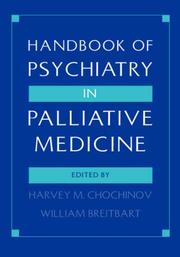| Listing 1 - 9 of 9 |
Sort by
|
Book
ISBN: 0199366330 0199366349 0199366322 9780199366323 1306531578 9781306531573 9780199917402 019991740X Year: 2014 Publisher: Oxford Oxford University Press, USA
Abstract | Keywords | Export | Availability | Bookmark
 Loading...
Loading...Choose an application
- Reference Manager
- EndNote
- RefWorks (Direct export to RefWorks)
One of the most challenging roles of the psycho-oncologist is to help guide terminally-ill patients through the physical, psychological, and spiritual aspects of the dying process. Patients with cancer, AIDS, and other life-threatening illnesses are at increased risk for the development of major psychiatric complications, and have an enormous burden of both physical and psychological symptoms. Concepts of adequate palliative care must be expanded beyond the current focus on pain and physical symptom control to include the psychiatric, psychosocial, existential, and spiritual aspects of care. T
Palliative treatment --- Terminal care. --- End-of-life care --- Terminally ill --- Care of the sick --- Critical care medicine --- Death --- Palliation (Medical care) --- Palliative care --- Palliative medicine --- Therapeutics --- Psychological aspects. --- Social aspects. --- Care and treatment --- Medical care
Book
ISBN: 0199380686 019938794X 9780199387946 9780199837243 0199837244 9780199380688 Year: 2014 Publisher: Oxford, [England] ; New York, New York : Oxford University Press,
Abstract | Keywords | Export | Availability | Bookmark
 Loading...
Loading...Choose an application
- Reference Manager
- EndNote
- RefWorks (Direct export to RefWorks)
The importance of spiritual well-being and the role of ""meaning"" in moderating depression, hopelessness and desire for death in terminally-ill cancer and AIDS patients has been well-supported by research, and has led many palliative clinicians to look beyond the role of antidepressant treatment in this population. Clinicians are focusing on the development of non-pharmacologic interventions that can address issues such as hopelessness, loss of meaning, and spiritual well-being in patients with advanced cancer at the end of life. This effort led to an exploration and analysis of the work of V
Mental healing. --- Cancer --- Imagery (Psychology) --- Imagery, Mental --- Images, Mental --- Mental imagery --- Mental images --- Imagination --- Visualization --- Cancer therapy --- Cancer treatment --- Absent treatment --- Health thoughts --- Mind-cure --- Psychic healing --- Alternative medicine --- Healing --- Parapsychology --- Mind and body --- Therapeutics, Suggestive --- Treatment. --- Therapy
Book
ISBN: 0199380678 0199387958 9780199387953 9780199837250 0199837252 9780199380671 019022357X 9780190223571 Year: 2014 Publisher: New York, NY
Abstract | Keywords | Export | Availability | Bookmark
 Loading...
Loading...Choose an application
- Reference Manager
- EndNote
- RefWorks (Direct export to RefWorks)
The importance of spiritual well-being and the role of ""meaning"" in moderating depression, hopelessness and desire for death in terminally-ill cancer and AIDS patients has been well-supported by research, and has led many palliative clinicians to look beyond the role of antidepressant treatment in this population. Clinicians are focusing on the development of non-pharmacologic interventions that can address issues such as hopelessness, loss of meaning, and spiritual well-being in patients with advanced cancer at the end of life. This effort led to an exploration and analysis of the work of V
Mental healing. --- Cancer. --- Imagery (Psychology) --- Imagery, Mental --- Images, Mental --- Mental imagery --- Mental images --- Imagination --- Visualization --- Cancers --- Carcinoma --- Malignancy (Cancer) --- Malignant tumors --- Tumors --- Absent treatment --- Health thoughts --- Mind-cure --- Psychic healing --- Alternative medicine --- Healing --- Parapsychology --- Mind and body --- Therapeutics, Suggestive

ISBN: 0931092485 Year: 2004 Publisher: Seattle, WA : IASP Press,
Abstract | Keywords | Export | Availability | Bookmark
 Loading...
Loading...Choose an application
- Reference Manager
- EndNote
- RefWorks (Direct export to RefWorks)
Medische psychologie --- Pain --- gezondheidspsychologie. --- Patients --- Psychology --- Psychological aspects
Book
ISBN: 0195301072 9780195301076 Year: 2009 Publisher: New York: Oxford university press,
Abstract | Keywords | Export | Availability | Bookmark
 Loading...
Loading...Choose an application
- Reference Manager
- EndNote
- RefWorks (Direct export to RefWorks)
Terminally ill --- Palliative treatment --- Hospice care --- Palliative Care --- Bioethical Issues --- Family --- Neoplasms --- Psychotherapy --- Terminally Ill

ISBN: 1280760567 9786610760565 0199748780 9780199748785 9781280760563 0195092996 9780195092998 Year: 2000 Publisher: Oxford New York Oxford University Press
Abstract | Keywords | Export | Availability | Bookmark
 Loading...
Loading...Choose an application
- Reference Manager
- EndNote
- RefWorks (Direct export to RefWorks)
Palliative treatment --- Terminal care --- Critically ill --- Psychological aspects. --- Medical care
Book
ISBN: 019764077X 9780197640777 Year: 2024 Publisher: New York, NY: Oxford University Press,
Abstract | Keywords | Export | Availability | Bookmark
 Loading...
Loading...Choose an application
- Reference Manager
- EndNote
- RefWorks (Direct export to RefWorks)
Caregiving is a physically, emotionally, socially, existentially, and financially demanding role that touches most people at some point in their lives. Without support, caregivers are at risk for their own physical and medical problems. Despite being a source of suffering, it at the same time presents an opportunity to connect to meaning and purpose. The authors of this book developed Meaning-Centered Psychotherapy for Cancer Caregivers (MCP-C), the first targeted therapy to comprehensively address existential distress and suffering in caregivers. Across seven sessions and through a series of didactic and experiential exercises, caregivers are guided to explore various sources of meaning in life that can become resources for them, especially when the challenges of caregiving are great. In this manual, the reader will find an overview and background on MCP-C, and in-depth descriptions of each of the seven sessions, with sample therapist scripts and handouts for caregivers engaged in MCP-C. It also includes a case example to bring the material to life. The goal of MCP-C is to provide caregivers with the tools needed to live life as fully as possible, despite the many challenges they face. Research on MCP-C with caregivers of patients with various sites and stages of cancer and across the caregiving trajectory supports the underlying mission of MCP-C: suffering is unavoidable but meaning and purpose is always possible.
Book
ISBN: 9780190097653 0190097655 Year: 2021 Publisher: New York, NY Oxford University Press
Abstract | Keywords | Export | Availability | Bookmark
 Loading...
Loading...Choose an application
- Reference Manager
- EndNote
- RefWorks (Direct export to RefWorks)
"Psycho-oncology, 4th Edition is solemnly dedicated to Professor Jimmie C. Holland, M.D., internationally recognized as the founder of the field of Psycho-oncology. Dr. Holland, who was affectionately known by her first name "Jimmie", had a profound global influence on the fields of Psycho-oncology, Oncology, Supportive Care, Psychiatry, Behavioral Medicine and Psychosomatic Medicine. At the time of her passing, Dr. Holland was the Attending Psychiatrist and Wayne E. Chapman Chair at Memorial Sloan-Kettering Cancer Center (MSK) and Professor of Psychiatry, Weill Medical College of Cornell University in New York"--
Cancer --- Neoplasms --- Risk Factors --- Patients --- Psychology --- psychology --- prevention & control --- therapy --- Psychological aspects
Book

ISBN: 1437735940 1437710158 1336232870 Year: 2011 Publisher: Philadelphia : Elsevier/Saunders,
Abstract | Keywords | Export | Availability | Bookmark
 Loading...
Loading...Choose an application
- Reference Manager
- EndNote
- RefWorks (Direct export to RefWorks)
Supportive Oncology, by Drs. Davis, Feyer, Ortner, and Zimmermann, is your practical guide to improving your patients' quality of life and overall outcomes by integrating palliative care principles into the scope of clinical oncologic practice at all points along their illness trajectories. A multidisciplinary editorial team, representing the dual perspectives of palliative medicine and oncology, offers expert guidance on how to effectively communicate diagnoses and prognoses with cancer patients and their families, set treatment goals, and manage symptoms through pharmacological therapies,
Pain --- Patient Care --- Diseases --- Neurologic Manifestations --- Signs and Symptoms --- Health Services --- Therapeutics --- Nervous System Diseases --- Pathological Conditions, Signs and Symptoms --- Health Care Facilities, Manpower, and Services --- Analytical, Diagnostic and Therapeutic Techniques and Equipment --- Health Care --- Pain, Intractable --- Palliative Care --- Neoplasms --- Medicine --- Health & Biological Sciences --- Oncology --- Oncology. --- Cancer --- Palliative treatment. --- Treatment. --- Cancer therapy --- Cancer treatment --- Tumors --- Therapy --- Treatment
| Listing 1 - 9 of 9 |
Sort by
|

 Search
Search Feedback
Feedback About UniCat
About UniCat  Help
Help News
News